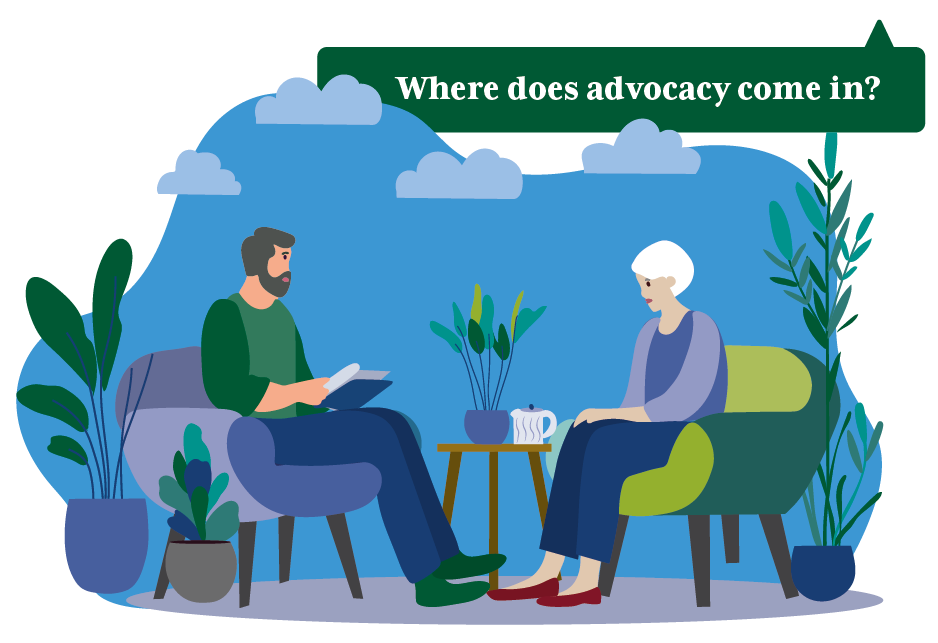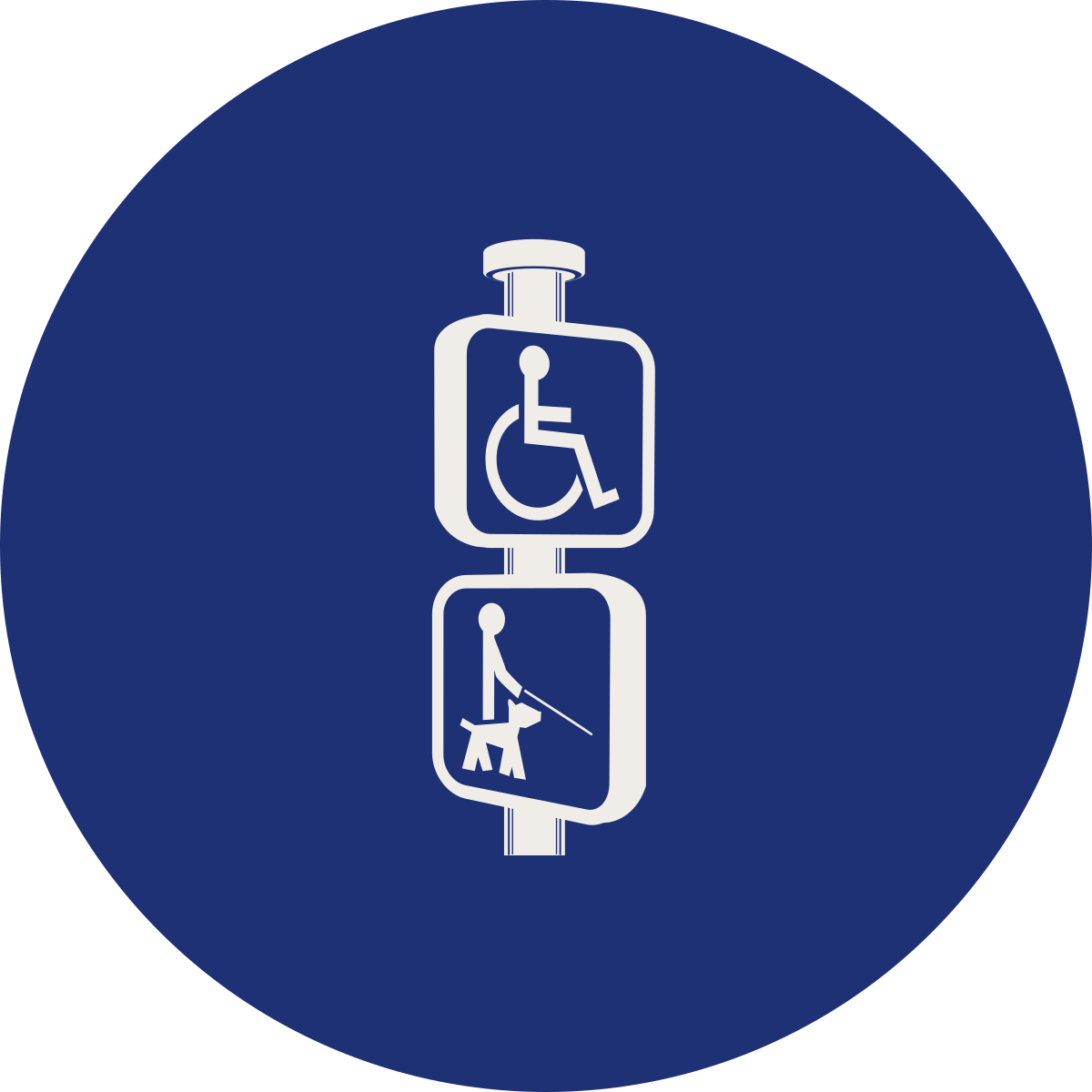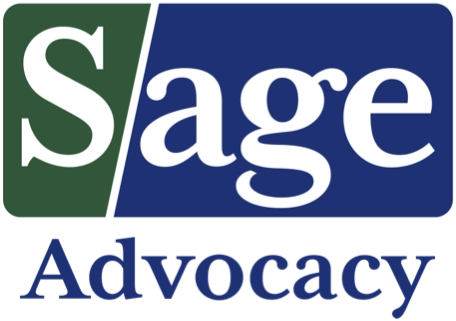applying to the court to become a decision-making Representative
Before starting the application...
When someone is unable to make certain decisions (the law talks about them as the Relevant Person), an application under the Assisted Decision-Making (Capacity) Act 2015 is sent in to the Circuit Court to ask for a Decision-Making Order and/or for the court to appoint a Decision-Making Representative to make a decision or specified decisions on their behalf.
Click the question spots below for legal definitions and more information about the phrases highlighted above. Your solicitor is likely to use these terms when talking about the process.

A Relevant Person means a person whose capacity is in question or may shortly be in question in respect of one or more than one matter; a person who lacks capacity in respect of one or more than one matter or a person whose capacity is in question or lacks capacity at the same time but in respect of different matters.
The Decision Support Service provides a Decision-Making Representation Order guide. You can access it here.
A Decision-Making representative means a person appointed by the court to act on a decision-making representation order to make a decision(s) specified in the court order on behalf of the relevant person. See the Decision Support Service's Decision-Making Representative guidelines here.
Guiding Principles
The new Assisted Decision-Making law contains a list of Guiding Principles, which must be followed to assist and support a person to make their own decisions before an application can be made to let anyone else take a decision in their place.
> Read more about the Guiding Principles
Read the legal text about how to use the Guiding Principles when intervening in a person’s decisions: Section 8(6) of the Act
If a decision is to be taken on the person’s behalf using a Decision-Making Order, it must be done in a way that:
- Puts as few limits as possible on the person’s rights and freedoms
- Respects their selfhood, their privacy, and their control over their affairs
- Isn’t over the top – it needs to get the right balance for the situation
- Only goes on for as long as it has to in order to take care of this particular situation.
You need to take all of this into account in the application to the Court.
Section 8(6) of the ADMC Act provides –
An intervention in respect of a relevant person shall—
(a) be made in a manner that minimises—
(i) the restriction of the relevant person’s rights, and
(ii) the restriction of the relevant person’s freedom of action,
(b) have due regard to the need to respect the right of the relevant person to dignity, bodily integrity, privacy, autonomy and control over his or her financial affairs and property,
(c) be proportionate to the significance and urgency of the matter the subject of the intervention, and
(d) be as limited in duration in so far as is practicable after taking into account the particular circumstances of the matter the subject of the intervention.
The Voice of the person in court
The Assisted Decision-Making Act says that the person who the application is about should be in court for the hearing – and they should get the support they need to attend.
Sometimes, that is simply not possible.
If they can’t be there for health reasons, or because they are unwilling to go, or for another good reason…
and if not being there won’t cause any injustice to them
…then, they can either be supported to attend via video link or their voice can be brought to the court by an independent third party.
Read the wording about this from Section 139(1) of the Assisted Decision-Making Act
An independent third party means someone unconnected to the person’s family or their care/service providers.

139. (1) An application to the court or the High Court under Part 5 (including an application under section 48 ), 7 or 8 shall be heard in the presence of the relevant person the subject of the application unless, in the opinion of the court or the High Court, as the case may be—
(a) the fact that the relevant person is not or would not be present in court would not cause an injustice to the relevant person,
(b) such attendance may have an adverse effect on the health of the relevant person,
(c) the relevant person is unable, whether by reason of old age, infirmity or any other good and substantial reason, to attend the hearing, or
(d) the relevant person is unwilling to attend.
The court must hear the voice of the person – in the courtroom, by video link, or from an independent third party. The court needs to hear their point of view about:
- Whether a Decision-Making Order is needed
- How they feel about the person applying to be their Decision-Making Representative
- What their wishes are about the decision or decisions that need to be made.
The Role of An Advocate in the process

If you are applying for a Decision-Making Representative Order and you know that attendance in court, even via video link, will be difficult or impossible for the person who is struggling with their decision-making, the person’s voice must be brought to the court by an independent third party.
An independent third party means someone unconnected to the person’s family or their care/service providers.
Independent advocacy is a professional support service provided by an organisation that is free from conflict of interest and is independent of family and service providers.
Delivering a professional independent advocacy service means providing a trained independent advocate who, on the basis of an understanding of a relevant person’s will and preferences, will support that person to make a decision and who will, if appropriate, go on to negotiate or make a case for them.
Sage Advocacy is one such agency. You can read Sage Advocacy's Quality Standards for Support and Advocacy Work with Older People here
An independent advocate can fulfil the role of independent third party. The advocate will ensure that the person’s human rights are respected throughout the process and that the Circuit Court hears their voice and can take their views and preferences into consideration.
When the Assisted Decision-Making Act mentions a relevant person, it means a person whose capacity to make one or more decisions is, or may shortly be, in question.
The Sage Advocate will arrange to meet the person whose decision-making is at issue (referred to in the legislation as the Relevant Person)
in order to deal with the matters outlined below…
The advocate will meet the person whose Life decisions are under the spotlight.
Their meeting will cover the following issues:

The advocate will explain to them, as fully as possible and in a way that they can understand, the reason for the visit.

The advocate is there to find out, insofar as possible, directly from the person, what their wishes are about the decision or decisions that need to be made.

As best as possible, the advocate will find out from the person what their beliefs and values are when it comes to decisions like this.

The advocate will ask them about their relationship with the proposed Decision-Making Representative. Is it a relationship of trust? Or is any power or undue influence being held over them? Could there be a conflict of interest between them?

The advocate will let the person know that he/she has the right to be supported to attend the court hearing. The advocate will then find out exactly what support he/she would need to attend; and will make sure that any necessary arrangements get made.

The advocate will note any particular support needs they may have that may not have been mentioned in the application.
The advocate writes up all the information into a report, which Sage Advocacy delivers directly to the relevant Circuit Court.
The application – Issues to be aware of

Information to provide to Sage Advocacy:
√ Confirm that a Statement of Capacity has been completed
√ Give details of the specific decision or decisions that the person is said to be unable to make at this time.
The Sage Advocate will then work on finding out the person’s wishes about the decision(s).
A functional capacity assessment must have been carried out. This looks at the person’s ability to handle the decision that has to be made. It asks: —
- Can the person understand the information involved in the decision?
- Can the person hold on to the information for long enough to make a choice?
- Can they weigh up the pros and cons?
- Can they communicate the decision in any way?
This is a legal test. It is not based on any medical condition that the person may have. It is not based on disability. It is not based on age. HSE guidance on carrying out the test can be found here.
The report that comes out of this is the Statement of Capacity, which must be sent to the court as part of the application for a Decision-Making Representative to be appointed.
Capacity is 'time specific'
It must be ensured that at the time when the application is made, the person does not have the capacity to make the life decision(s) that the application is about. A Decision-Making Representative can only be appointed for the decisions that need to be made AT THIS TIME. Decisions that may need to be made at a future time will have to be the subject of a later Decision-Making Representation Order.
Capacity is 'issue specific'
Just because a person lacks capacity to make a decision on one particular matter, does not mean they are unable to make decisions on other matters. A Decision-Making Representation Order is limited in SCOPE and DURATION. It applies to particular matter(s) at a point in time. It is not free rein for someone to make all decisions on a person's behalf. Applications should clearly outline the specific decision or decisions that need to be taken to support the person.
Types of decisions
The Assisted Decision-Making Act puts decisions into two separate categories – ‘property and affairs’ decisions and ‘personal welfare’ decisions. The court won’t accept an application that says all ‘personal welfare’ and all ‘property and affairs decisions’ need to be made on behalf of the person.
In the Statement of Particulars (Form 55b), you need to outline the specific decision to be made under the relevant category heading. The ‘personal welfare’ section starts on p11 and the ‘property and affairs’ section has multiple sections starting on p13.

FINANCIAL DECISIONS
The person may have:
CASH ASSETS – accounts in banks, credit unions, An Post; and
NON-CASH ITEMS – property
The application should identify the exact cash or property items that the court is being asked to give authority over. If a purchase or sale using the person’s assets needs to be made for their benefit, include those details.

PERSONAL WELFARE DECISIONS
Some of the ‘personal welfare’ decisions in the new law are rights protected by the Constitution – so it is important to understand that for some such decisions the Circuit Court does not have the power to make an order. If this is the case, it might be necessary to apply to the High Court.

DEPRIVATION OF LIBERTY
A ‘personal welfare’ decision about the person’s accommodation, or about where they should live, must take into account the person’s past and present ‘will and preferences’ (views and wishes). Moving someone to a place against their will and preferences would take away their constitutional right to liberty. If there are reasons to push for a move against a person’s wishes, a separate application must be made to the High Court.

HEALTHCARE DECISIONS
The court can’t appoint a Decision-Making Representative to make general healthcare/treatment decisions – it will give them authority to make specific decisions.
LIFE-SUPPORT ISSUES GO TO HIGH COURT The Circuit Court can not authorise a Decision-Making Representative to “refuse consent to the carrying out or continuation of life-sustaining treatment or consent to the withdrawal of life-sustaining treatment for the relevant person”. This is a matter that requires an application to the High Court.
A court application over a healthcare decision will only be required if the person has not made an Advance Healthcare Directive about the specific healthcare or treatment decision(s) that need to be made.
Information to provide to Sage Advocacy:
√ Details of the specific decision or decisions that need to be made. These details enable the Sage Advocate to properly perform their role in finding out the person’s wishes about the specific ‘property and affairs’ or ‘personal welfare’ decision or decisions.
Is there anything less intrusive that could still be tried?

Before making an application to the court, you must make sure that all steps have been taken to support the person in the least intrusive manner possible. This may include through supported decision-making arrangements such as a Decision-Making Assistance Agreement or a Co-Decision-Making Agreement or through other informal mechanisms that would allow the person to keep control over those decisions. One example of an informal mechanism would be getting in touch with the Vulnerable Customer Unit of the person’s bank about arranging payments from their account to cover care costs.
Protecting the person's privacy
One of the Guiding Principles of the Assisted Decision-Making Act is that access to the person’s information is kept to a minimum. A Decision-Making Representative can only access what information that they could reasonably need for making the decision(s) that they have been appointed to make; and they can only use the information at the time and for that exact purpose and no other.

Acting always in good faith and for the person's benefit

The Assisted Decision-Making Act makes it clear that the wishes of the person must be respected at all times and, if it is not possible to find out what their wishes are about the decision(s) to be made, then the Guiding Principles say that anyone stepping in to act on their behalf must always do so without an agenda and for their benefit.
“…act at all times in good faith and for the benefit of the relevant person”.
decision making representative: Rules & duties

Every matter included in the Decision-Making Representative Order must be included in the reports to the Decision Support Service. This applies to ‘property and affairs’ decisions and ‘personal welfare’ decisions.
Once a Decision-Making Representative Order is made, the Court will send a copy of it to the Decision Support Service (DSS).
The DSS will contact the appointed Decision-Making Representative to explain the duties of the role. The Decision-Making Representative must make regular reports to the DSS based on the decisions included in the Decision-Making Representation Order. These are the reports:
- Initial Report – to be sent to the DSS within three months of being appointed, if the court has authorised property and affairs decisions to be made.
- Annual Report – to be put in to the DSS within 12 months of being appointed, and then on an annual basis after that, unless the court has asked for reports to be filed earlier and/or more frequently.
- Annual Accounts – to be sent in along with the Annual Report if there are property and affairs decisions involved.
Looking again at the person's abilities to decide

REVIEW OF CAPACITY
- At the Court hearing to appoint a Decision-Making Representative, the Court will name a date for when it will review the capacity of the person. The Decision-Making Representative will have to come back to court on the Review Date. As well as reviewing the capacity of the person, the court will ask the Decision-Making Representative to report on the performance of their duties. On the Review Date the Court may –
- Cancel the declaration about the capacity of the Relevant Person
- Change or cancel the Decision-Making Representation Order
- Give a direction to make the Order work better.
Making a referral to sage advocacy
To make a referral to Sage Advocacy, please complete the referral form on the website here. If you would prefer to print and fill the form, or to work on it offline before emailing it to info@sageadvocacy.ie, it can be accessed here. Be sure to include all the information that will help the advocate to support the person with getting across their wishes about the decision(s) that the court application is about. Write down clear details about the specific decision(s) involved.
When contacting Sage, please be mindful of the time needed to follow up with the person. If you need more information or guidance, please contact Sage Advocacy’s Information and Support Team on 01 536 7330.



